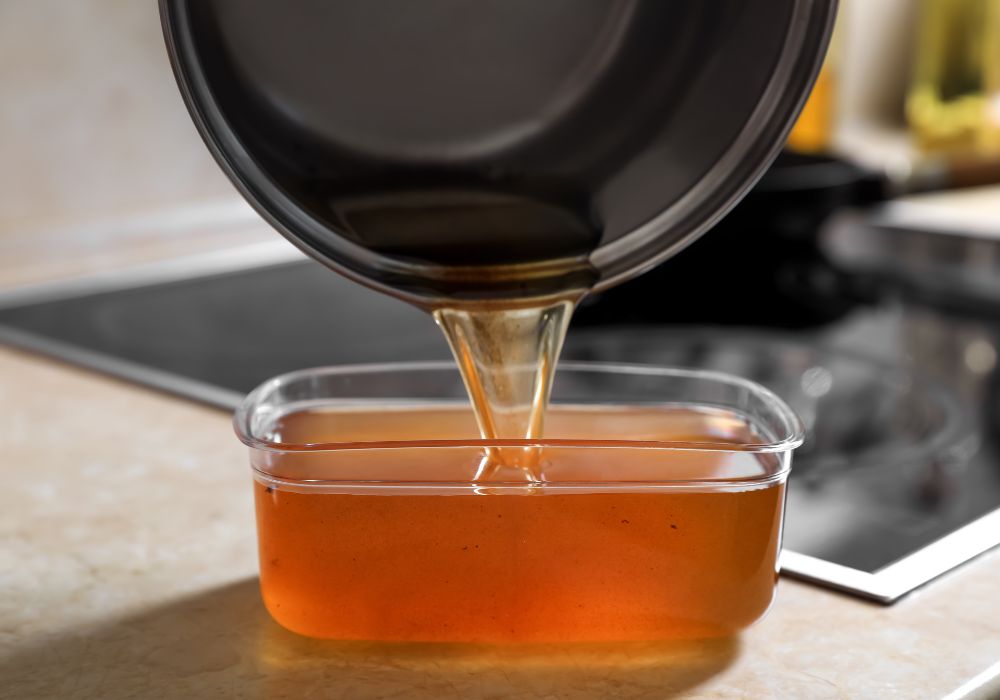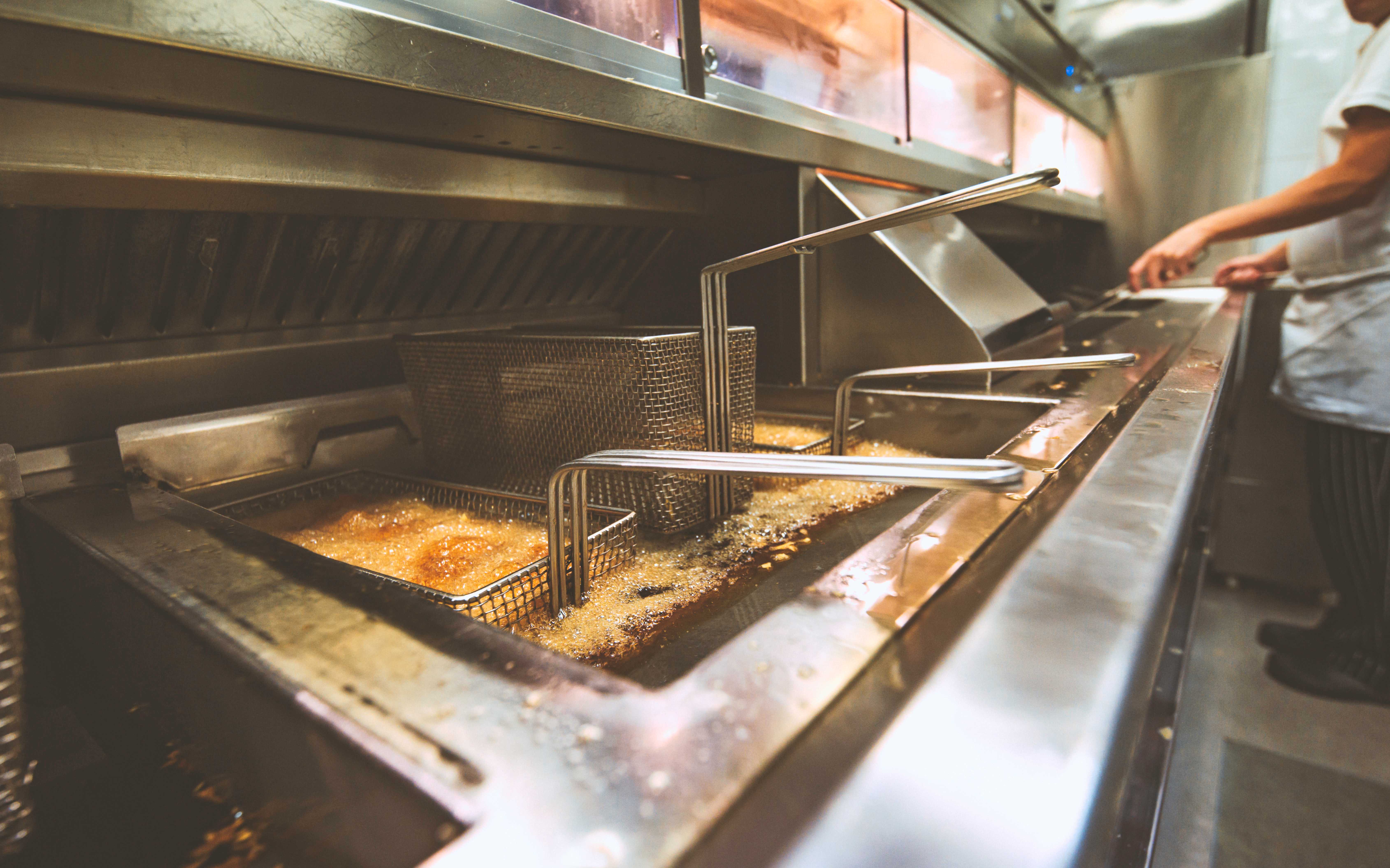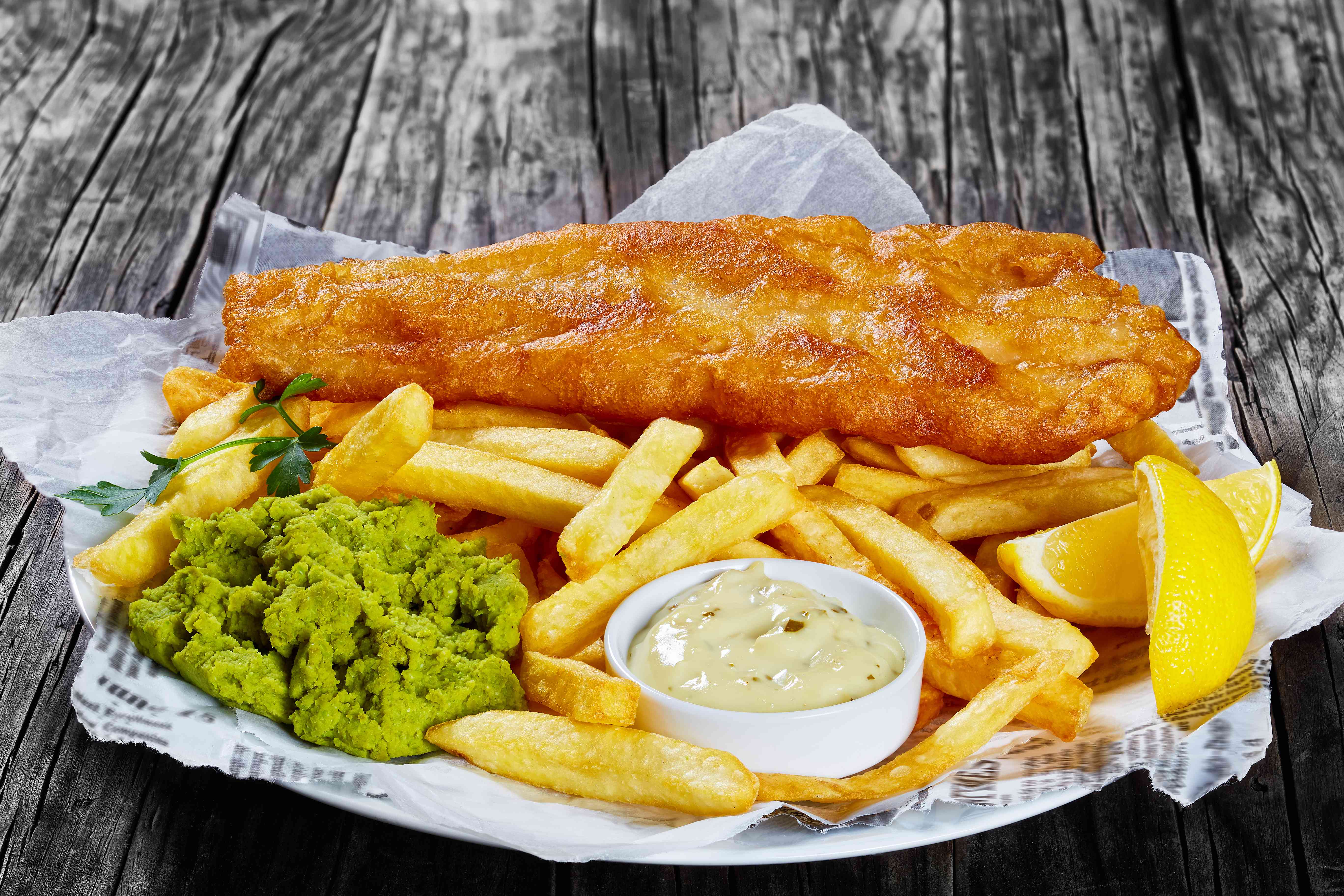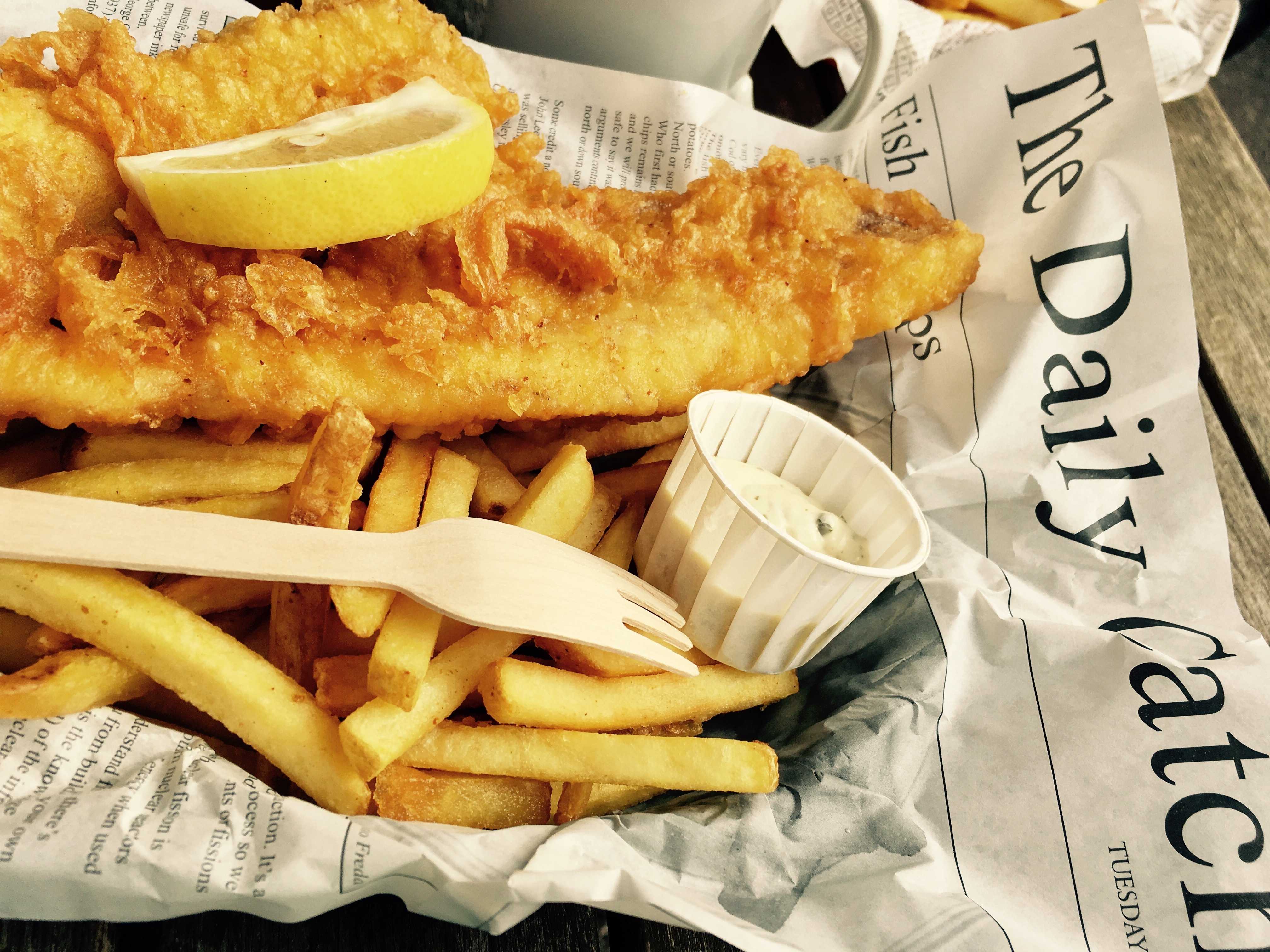In the dynamic realm of culinary practices, the responsible disposal of used cooking oil has become an integral aspect of waste management. This extensive guide from Frymax, the UK’s leading supplier of sustainable palm oil, looks at how to recycle cooking oil, the laws around cooking oil recycling in the United Kingdom, potential penalties for non-compliance, and effective recycling practices for restaurants and chippies. Additionally, it delves into the multifaceted environmental benefits of proper oil disposal and the frequency at which cooking oil should be replaced to maintain both food quality and regulatory adherence.
How Much Oil Do Restaurants in the UK Use?
Cooking oil has a shelf life, and in the restaurant industry, it tends to reach this after 2-3 usages. This is because the oil gradually becomes oxidised, often overheated, and gets full of burnt food debris, giving the oil a bitter and unpleasant flavour. Not only does this make food taste bad, but it also has been linked to severe health risks like cancer, as well as increased fire risks from food particles catching alight.
Consequently, commercial fryers necessitate oil changes approximately once to twice a week, depending on how often the oil is used. This process results in a substantial volume of used cooking oil, with a standard tabletop fryer holding 10 litres. This suggests that small to medium-sized businesses use around 20 litres weekly, though many establishments consume significantly more oil at faster rates. This surge in oil usage raises environmental concerns, emphasising the importance of proper and timely disposal of cooking oil.
Disposing Of Used Cooking Oil
Legal Framework
At the core of used cooking oil disposal in the UK lie three pivotal pieces of legislation – the Environmental Protection Act 1990, the Food Safety Act 1990, and the Controlled Waste Regulations 2012. These regulations mandate that businesses engaged in waste production, including used cooking oil, must register as waste producers with the Environment Agency.
Non-Compliance and Penalties
Non-compliance with these regulations triggers a cascade of penalties, ranging from fines to legal actions and even closure orders. Beyond the direct legal ramifications, businesses face reputational damage in an era where consumers increasingly prioritise eco-friendly practices.
Can Used Cooking Oil Be Recycled?
Yes! The recyclability of used cooking oil is a critical consideration for businesses aiming to adopt sustainable practices. This section provides a detailed exploration of the possibilities and benefits associated with recycling used cooking oil.
Types of Oil Suitable for Recycling
Diverse cooking oils, including vegetable oil, sunflower oil, rapeseed oil, palm oil and animal fats, can undergo the recycling process. However, oils heavily contaminated through specific processes, such as frying fish, may have limited recycling potential and this oil may need to be safely disposed of instead.
Recycling Process
The recycling process involves a sophisticated array of methods, including filtration, sedimentation, and water removal, aimed at separating impurities and contaminants from used cooking oil. Upon arrival at the processing site, your used cooking oil undergoes a thorough procedure, extracting any food fragments and water. These by-products are subsequently utilised in our anaerobic digestion plant, ensuring zero wastage. The used cooking oil is rigorously tested and analysed during this process to evaluate its quality and value.
Collection Points
Businesses looking to establish secure collection points for used cooking oil can collaborate with licensed waste collection services. These services not only provide secure containers but also ensure strict compliance with environmental regulations.
How to Recycle Used Cooking Oil
This section outlines a practical roadmap for restaurants and chippies, detailing the seamless integration of effective recycling practices for used cooking oil.
Establishing Collection Systems
To facilitate the proper collection of used cooking oil, establishments must design dedicated systems equipped with secure containers featuring leak-proof lids to mitigate spills and contamination risks. It is essential for businesses to appropriately store spent cooking oils on-site until a licensed waste carrier can collect them. Businesses generating used cooking oil must ensure its collection by a licensed waste oil management company, stored in designated tanks, and prevent any leakage from the storage containers. Improper storage of used cooking oils on the premises can lead to unpleasant odours, pest infestations, and breaches of food hygiene regulations.
Choosing a Reputable Collection Service
Always hire an Environment Agency Registered cooking oil disposal company that specialises in recycling used cooking oil is pivotal. These services offer secure containers, adhere to regular pickup schedules, and ensure strict compliance with environmental regulations.
Staff Training
The importance of proper oil disposal and the procedures for using designated containers for recyclable oil and oil that needs to be disposed of must be communicated clearly to kitchen staff. Education fosters compliance and instils a culture of environmental responsibility within the establishment.
Why Recycle Used Cooking Oils?
Environmental Benefits
The recycling of used cooking oil serves as a critical bulwark against environmental pollution, particularly water contamination. Repurposing the oil for biodiesel production contributes to reduced greenhouse gas emissions and a diminished reliance on fossil fuels.
Resource Conservation
Reusing cooking oil tangibly lessens the demand for new oil production, aligning with the principles of a circular economy and conserving precious natural resources.
Legal Compliance
Properly recycling used cooking oil ensures compliance with environmental laws, shielding businesses from potential legal consequences and safeguarding their reputation in an increasingly eco-conscious consumer market. Failure to appropriately dispose of oils can result in substantial fines for businesses. In more severe instances, the business may face permanent closure or enforced cessation of trading under the Food Safety Act (FSA) 1990.
What Happens to Used Cooking Oil Once It Has Been Recycled?
Recycled cooking oil undergoes various transformations, finding utility in diverse applications beyond its initial culinary purpose. One prominent avenue is the production of biodiesel, a sustainable alternative to traditional diesel fuel. This eco-friendly biofuel contributes to reducing greenhouse gas emissions and lessening dependence on fossil fuels in the transportation sector and is even used to supply fuel to power the national grid.
Additionally, recycled cooking oil serves as a valuable resource in industrial processes, playing a role in manufacturing, soap production, and even serving as a feedstock for animal food. Its versatility underscores the significance of proper recycling practices, showcasing how a humble kitchen by-product can have a far-reaching impact on environmental sustainability and resource conservation across multiple industries.
How Often Should Cooking Oil Be Replaced?
In restaurants, the frequency of cooking oil replacement is a critical aspect of maintaining food quality and adhering to health and safety standards. Factors such as regular quality assessments, efficient filtration systems, temperature control, usage patterns, and the utilisation of testing kits play pivotal roles in determining when cooking oil should be replaced, ensuring a consistent and high-quality culinary experience for patrons.
Quality Assessment
Regularly assessing cooking oil quality involves monitoring colour, smell, and taste to identify signs of overuse. Darkened oil, unpleasant odours, and compromised food flavour are indicators that replacement may be necessary.
Filtration
While implementing a filtration system can extend the lifespan of cooking oil by removing impurities, even filtered oil will inevitably degrade, necessitating eventual replacement.
Temperature Control
Maintaining proper frying temperatures is essential, as overheating can speed up oil degradation. Regularly monitoring oil temperature and using an oil with a high smoke point like sustainable palm oil ensures consistent quality and longevity.
Usage Patterns
Considering the volume and frequency of frying operations is crucial. High-volume establishments may find it necessary to replace cooking oil more frequently than smaller establishments with lower usage.
Testing Kits
Investing in oil testing kits, specifically designed to measure Total Polar Material (TPM) content. This is a crucial metric in cooking oil quality assessment. It measures the level of degradation and contamination, aiding in determining the optimal time for oil replacement to maintain food quality and safety standards in commercial kitchens.
Cleaning Schedules
Implementing a cleaning schedule for all deep fat fryers will help you get longevity from your chosen cooking oil. Burnt-on carbon within the fryers will lessen the life of your oil and also taint the food being cooked. This will also lead to extended cooking times as the fryer will not be as efficient when carbon is burnt-on.
Recycling cooking oil transcends a legal obligation; it is a pivotal stride towards environmental sustainability. Restaurants and chippies must meticulously adhere to UK environmental regulations to avoid penalties and contribute to the responsible management of waste. By establishing robust collection systems, engaging with reputable waste collection services, and staying informed about the quality and lifespan of cooking oil, businesses become crucial players in creating a greener and more sustainable future. Adopting proper recycling practices not only benefits the environment but also ensures legal compliance and upholds the reputation of businesses in the food service industry, marking them as conscientious contributors to a healthier planet.
Choose Frymax for Sustainable Palm Oil in the UK
Discover the choice of culinary experts for over 60 years – Frymax, the preferred cooking oil for fryers! As a leading supplier of deep fat fryer oil nationwide, we pride ourselves on delivering excellence. Frymax is the answer – a premium, 100% natural, and sustainable palm oil perfect for deep frying, with less than one percent trans fatty acids.
Our RSPO certified oils are not just pure but also free of additives, allergens, GM ingredients, and hydrogenated oils, catering to every kitchen’s needs. With a legacy of outstanding quality for six decades, we’ve earned the loyalty of customers spanning over a quarter-century.
For more details or to become a Frymax member, unlocking exclusive content, expert frying advice, and exciting competitions, contact us today!






